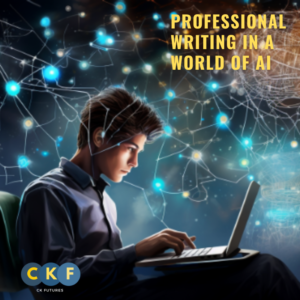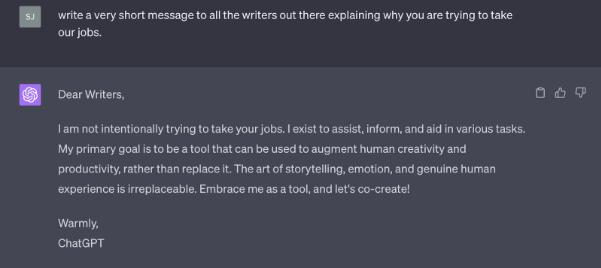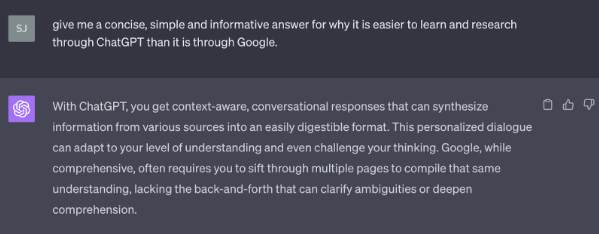 Humans are excellent writers. We use language to create gripping narratives, evoke emotions, explain complex ideas, and display our unique identities. Artificial Intelligence is on a mission to mimic our linguistic skills and it’s doing very well.
Humans are excellent writers. We use language to create gripping narratives, evoke emotions, explain complex ideas, and display our unique identities. Artificial Intelligence is on a mission to mimic our linguistic skills and it’s doing very well.
To imagine a realistic future for writers, we’ll look at the implications of AI joining the workforce, how to upskill with AI tools, and how writers can use their humanity to stand out.
The Emergence of AI in Writing
AI has gradually made its way into everyday writing tools, evolving from basic spell check to apps like Grammarly, to predictive text, and now to sophisticated large language models (LLMs) like ChatGPT.
Writers can use LLMs to help with brainstorming, research, drafting, editing, and more. In fact, their use cases are so broad that you might be questioning how useful you’ll be in ten years. Don’t worry, ChatGPT has a message for you.

Well, I certainly feel warm and safe now.
If you’re curious about the inner workings of this technology, you might enjoy my deep dive into the topic.
Technological Deflation: Are Professional Writers Heading for Extinction?
 The idea of jobs being replaced by AI is obviously controversial; Jobs provide purpose, form identities, and put food on the table. The pain caused to individuals through job loss is no joke, especially if they struggle to reskill and adapt to a new environment. However, in the past, jobs getting automated or augmented by technology has generally given people more liberty in the ways they can add value to society. We’ve seen this throughout all the industrial revolutions and hopefully, the same will be true with AI and human writing – or perhaps this time will be different and we’ll all become potatoes.
The idea of jobs being replaced by AI is obviously controversial; Jobs provide purpose, form identities, and put food on the table. The pain caused to individuals through job loss is no joke, especially if they struggle to reskill and adapt to a new environment. However, in the past, jobs getting automated or augmented by technology has generally given people more liberty in the ways they can add value to society. We’ve seen this throughout all the industrial revolutions and hopefully, the same will be true with AI and human writing – or perhaps this time will be different and we’ll all become potatoes.
Anyway,
Let’s look at how sustained AI adoption might impact the value of human writing in its current form.
AI’s Impact On The Demand For Writers
Can Anyone Be a Professional Copywriter Now?
Does creating an AI-generated image make you an artist? No, but you can still use the art as a background for your website. The same is true for copywriting.
You could build a website that sells the finest horse manure, using ChatGPT to help express your knowledge and passion. You could follow your dream of becoming a Door-to-Door Doormat Salesperson, using ChatGPT to create your sales pitch. These playful examples undersell its potential, so if you’re curious about more realistic use cases, you can check out this list by GreatAIPrompts.
Sure, a skilled writer would do a better job, and human expertise in branding, cultural nuances, ethics, and storytelling will add value for years to come. However, Large Language Models are only getting smarter, cheaper, and more accessible. This means businesses will find it increasingly difficult to justify paying professional writers and increasingly likely that they’ll opt for using AI that’s “good enough”.
Are Content Writers Safe?
So, copywriting may eventually get swallowed by AI, but what about content writers?
The obvious way that AI will have an impact here is by producing its own articles or blogs for publishers. Any form of basic content based on widely accessible information is at risk because AIs have access to that data. This includes news summaries, listicles, data reports, How-to’s, event recaps, and market updates. AI-generated content currently has a robotic twang and leaves a lot to be desired. However, these generic answers are created by generalist AIs designed to do a bit of everything. Moving forward, we’ll see a lot more specialised AIs from companies like Google, who are currently testing AI that specialises in writing news articles.
Luckily, there are many types of content that benefit greatly from our human touch. Just to name a few, we have:
- Personal Stories
- Opinion Pieces
- Investigative Journalism
- Art Critiques
- Satire and Humour
- Long-form and High-level Essays
- Interviews
- CV Writing
- Poetry
- Cultural and Social Commentary
- Ethical Discussions
- Travelogues
Whoop, I guess there’s still a lot going for us!
Seriously though, amidst all the AI hype, it’s important we don’t overlook the mind-boggling amount of human complexity that goes into creating these forms of content. Remember that AI doesn’t have a true understanding of anything it says, just the ability to fake it by noticing statistical patterns in the data it’s been trained on.
Another way AI will affect content writing is through a general shift in the way people search for information – moving from search engines towards LLMs with internet access. Soon you’ll be able to ask your AI for a weekly news roundup that covers all your interests. People will still read human articles, but as with copywriting, it will become increasingly difficult to attract attention away from AIs that are far more efficient at communicating information.
Not only could it provide a summary, but it could explain all the intricate details and the less obvious implications, reduce bias by providing multiple viewpoints, or even write you a poem about it.
AI’s Impact on the Supply of Written Content
So, we’ve discussed some of the ways that AI could potentially reduce the demand for human writers, now let’s move on to the supply of written content.
An experiment out of MIT showed that the use of ChatGPT results in significant increases in average productivity and quality for mid-level professional writing tasks.
Let’s imagine tech-savvy John learns how to implement AI into his workflow and increases his output from one article a day to two. At £100 an article, he’s gone from earning £100 a day to £200 a day.
But is John really twice as valuable?
Being more efficient doesn’t necessarily make your work less valuable. However, if AI is widely adopted and writers are able to produce more, we’ll see a surge in the supply of written content. Pairing this with the downward pressure on demand, the market could become oversaturated. In this scenario, writers are more likely to lower their prices to retain or attract business. On top of this, as higher-quality writing becomes more abundant, its perceived value diminishes, adding further downward pressure on prices.
Adapting to the AI Era
Each year the new iPhones have sold for roughly the same price. However, manufacturing an iPhone 4 today would cost a fraction of the price it did in 2010 and I’d personally trade one for some apricots.
This means that like the iPhone, a writer must evolve to ensure nobody offers them apricots for their services.
Using AI Tools
The Harvard Business Review published an article stating that “AI Won’t Replace Humans — But Humans With AI Will Replace Humans Without AI”
I mostly agree with this as it’s becoming evident that AI has the ability to fully automate certain jobs. But I agree with the sentiment that at some point, most jobs will be augmented and humans will be forced to implement AI tools, so you might as well start now.
Prompt Engineering
‘Prompt Engineering’ is the art of designing your prompt in a way that helps the AI choose what to focus on, allowing it to provide the most useful response. This is a massively underappreciated skill and has a huge influence on how impactful AI can be on your workflow.
Not every prompt has to be perfect to get a good answer but here’s how I’ve learned to create a good prompt.
- Identify your objective – what do you hope to achieve/learn with the answer?
- Be specific – clearly define what you want the AI to provide
- Provide context – this allows the AI to tailor its response to your situation
- Be aware of its limitations and weaknesses
- Don’t expect too much from a single output – the more you ask for in one prompt, the less it can focus its ‘brain power’ on a specific request
- Trial and error – if the answer isn’t good enough, either ask follow-up questions for clarification or find out where you went wrong and rephrase your prompt.
It’s also worth noting that the longer a conversation goes on, the more their answers will deteriorate in accuracy and nuance. Providing context is good but long back and forths can cause them to lose sight of the bigger picture and wider conversation. If you notice this happening, simply start a fresh conversation.
Research
When I want to learn something, I use ChatGPT at least 75% of the time. A lot of people laugh at me for it so I thought it would be fitting to let it explain why.

On top of this, it can help identify knowledge gaps, offer insights on data, summarise articles, provide literature reviews, and overall, offer a significantly more engaging and interactive learning experience.
Editing
While ChatGPT still struggles with writing original content, it is a very powerful tool for editing. Here are some of the things it can help with:
- Spelling and Grammar
- Sentence Structure
- Style and Tone
- Paraphrasing
- Organisation and Flow
- Consistency Checks
- Vocabulary Enhancement
- Spotting Redundant Sentences
- SEO (Search Engine Optimisation)
As with writing, it’s far from perfect and cannot be solely relied on. Like Grammarly, it can help spot what you’ve missed but also makes mistakes itself. So it’s not an all-in-one solution, but it can help catch the little things and
spark your own ideas for improvement.
Making the most of your humanity
 While AIs can conjure up decent stories, they don’t have a deep well of memories and all the emotions that come with them. I cried reading someone’s newsletter the other day and I’m damn sure that only they could’ve told their story in such a way. Empathy for other humans isn’t going anywhere and if AI manages to write stories that evoke such strong emotions, we will demand ways of knowing whether or not a human wrote it or not.
While AIs can conjure up decent stories, they don’t have a deep well of memories and all the emotions that come with them. I cried reading someone’s newsletter the other day and I’m damn sure that only they could’ve told their story in such a way. Empathy for other humans isn’t going anywhere and if AI manages to write stories that evoke such strong emotions, we will demand ways of knowing whether or not a human wrote it or not.
On top of being excellent storytellers, we are quite weird and have interesting personalities. Your opinions and the quirky ways you communicate them will be what people tune in for. Finding your voice has never been so important because if you don’t, you’ll blend in with all the machines. Write about what you’re actually passionate about. By doing this you can more easily stay true to yourself, take from personal experience, and stay motivated.
Is There a Future For Professional Writers?
Unfortunately, our future is in the hands of consumers. In the same way that a lot of kids neglect the outdoors because of video games and some parents neglect their kids because they’re addicted to their phones, readers might neglect powerful human writing because they’re addicted to quick and easy information.
We don’t know how good AI is going to get, but hopefully, we’ll put up a good fight while evolving into even better storytellers. And if professional writing ends up being unprofitable, perhaps we’ll be living in a world where automation allows us to become fully immersed in sharing our passions, without relying on them for income.
Article researched and written by Sam Eve for CK Futures Ltd.
Article researched and written by Sam Eve for C K Futures Ltd.
Sam Eve is an independent Tech Journalist, Editor for ICS – Digital, professional CV writer, and an International Business Degree student at Leeds University. Starting paid work at the age of 10 as a sports coach, he has worked for marketing companies since the age of 16, quickly becoming a top performer and learning the art of B2B and B2C sales. Sam is also a musician and guitarist, creating and producing music released on digital platforms. During his gap year Sam became interested in the financial markets, the global economy, tech and AI.
